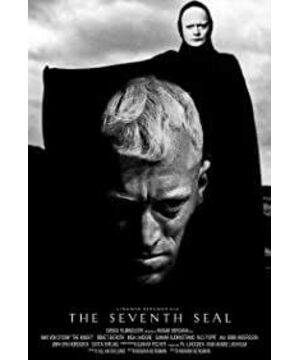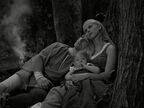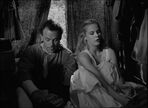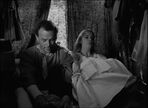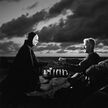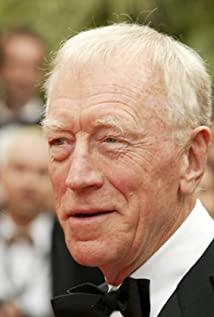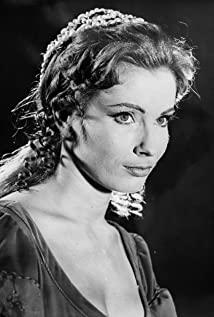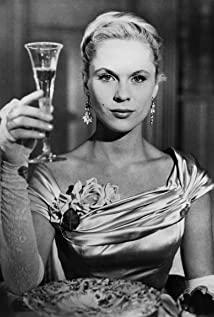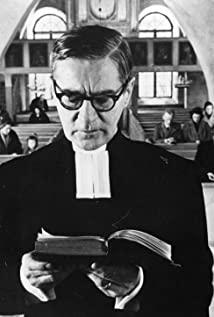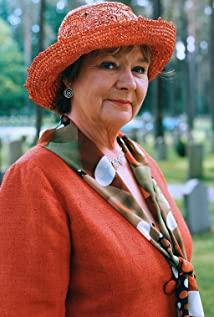Strange to say, I remember watching this movie because I watched a romance film like "500 Days with Summer" not long ago. In the film, the male protagonist Tom is alone in the movie theater holding popcorn after falling out of love. One of the movies he watched was an imitation of "The Seventh Seal" in which he played chess with death. Helpless is a prophecy. Now I have fallen into the same tragic situation as Tom. Based on the revolutionary friendship of the same disease, I also plan to watch "The Seventh Seal" to heal my wounds.
Okay, stop gossip and start talking nonsense.
1. This film is not only the part of the church dialogue that reminds me of "The Brothers Karamazov", but the film's characters are also clearly symbolic, like Mijianka, Ivan, Alyosha and Snyrtev.
For example, the theme of the film is that the protagonist, the knight, BLOCK, returns home, both physically and spiritually. In this "Odyssey", I met all kinds of people. It can be seen from the church conversation that he has lost his faith in God, but is eager to return to the embrace of God. When the journey was complete, he embraced death.
The entourage of the protagonist BLOCK, JONS, looks like a CYNIC, who does not believe in God and love. But his rationality, bravery, and sense of justice, especially at the end of the film, when death comes to his life, his monologue like a self-talk, makes me feel that Bergman has given him more meaning.
Josef the Clown, he saw the Virgin Mary with Jesus as soon as he appeared, and at the end he saw Death with BLOCK and others dancing to accept the doomsday judgment. His devout beliefs made me think he was an Alyosha-like character for a while, but there was a scene where he stole a bracelet for his wife after being humiliated in a bar.
In addition, there is LISA, the blacksmith's wife who symbolizes debauchery and deceit, and SKAT, another clown actor. The bluffing blacksmith PLOG. Stealing priest Raval.
2. The background of the film is set in Sweden, where the plague was ravaged in the 14th century. This setting is easily reminiscent of Boccaccio's "Decameron", both in the late Middle Ages and the same plague. It stands to reason that it should be the easiest time for people to believe in God when the plague is raging, saying that all these plagues are God’s punishment for the depravity of mankind. However, on the contrary, the plague is raging, and even the priest has fallen to the point of making a fortune. In the film, Father Raval went to a barn and found a woman who had died from the disease. Instead of praying for her, he stole her gold bracelet. In Decameron, too, the priest and the nun start messing around.
3. So our protagonist BLOCK is confused. He wanted to believe in God, but faced the harsh reality. So in church, he said to Death:
"I want knowledge."
"You want certainty?"
"Yes."
Now that the glory of God has been ruined by these priests, it is worth believing that knowledge. It also heralded the arrival of the Renaissance. I often think that people in the Renaissance may be the happiest, thinking that they have bid farewell to the dark age of ignorance, and that they can reach the promised land as long as they use their own reason. But the director couldn't just shoot the Middle Ages just to shoot the Middle Ages, he obviously thought we had the same problems that we had at the time. What's the question? Let's take a look at Tarkovsky's "Stalker", a writer and physicist who symbolizes art and science, was brought into the ZONE by the stalker, the outside world is already a doomsday scene, the promised land is simply a piece cemetery. The 20th century had the same problem, and Tarkovsky believed that returning to religious ignorance was the way out.
Knowledge itself seems to have played a 20th century joke. Certainty itself is slowly losing its absoluteness in knowledge with the discovery of limits, quantum mechanics and the unconscious. Not only are we uncertain about the external world, we cannot even find certainty within the subject itself.
4. I love the three chessboard battles between BLOCK and Death. For the first time, he used tactics to win the death, but in the church confession to the priest, he said the way to win. Unexpectedly, the priest turned out to be the death himself, and he realized that fate was irresistible. For the second time, he took the plan and let the god of death step into his trap, and then smiled mischievously and contemptuously at the god of death. It was a gesture of existentialism facing nothingness. Even if I was destined to die in this duel, I still have the ability to make The duel becomes exciting. The third time he was more free and easy, and he didn't care if he knocked over the pieces. As long as he could delay the time and let the Joker and his wife go, even if they lost the game, they would win. When he returned home, he saw that his wife was still waiting faithfully in this troubled time, so he converted to God and gladly accepted the call of death.
5. There is a very interesting scene. The blacksmith found his unfaithful wife LISA and the clown SKAT who had an affair with him. They chased after a person in the jungle, and then the two began to confront each other. At this time, JONS in the back of the screen was like the audience watching a drama. , to start a review. . . JONS's speech at the end also seems to be taken out of the movie, like a direct dialogue with the audience, which is a very interesting character.
6. Why do people make films of faith, such as "The Seventh Seal" and "Ten Commandments", but we film "Confucius"? !
View more about The Seventh Seal reviews


